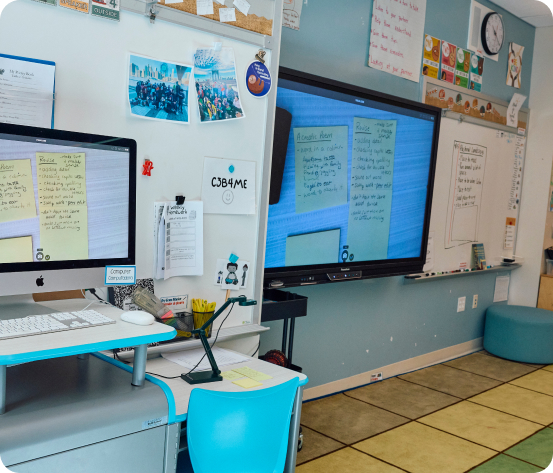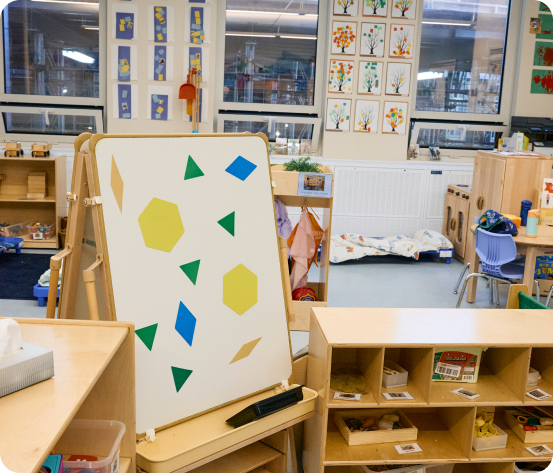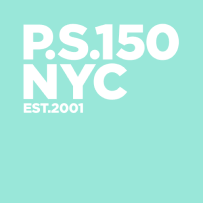Content Studies
Studies at PS 150 are centered on social studies and science core curricula. Through rich thematic units, students develop skills such as inquiry-based research, nonfiction writing, oral communication, and artistic expression and appreciation. Enrichment programs in art, music, dance/theater, and science support classroom studies as well.
In each grade, students typically engage in two major studies a year. Our integrated approach is based on the tenet that people learn best when they have a meaningful context to help them see the purpose of—and be invested in—related reading, writing, mathematics, art, and research of all kinds. At PS 150, learning in all subjects is enriched by relevance to a topic that occupies a central place in the life of the class.
By studying human and natural organizations throughout elementary school, children develop a respect for and appreciation of diverse ways of working and living together.
Elementary school-age children have a natural curiosity to understand the world in which they live. When allowed to explore that world through the organization of an integrated curriculum, children can build on what they know as they learn through meaningful interactions with their environment.
English Language Arts
PS 150 classrooms are rich with language and print. In Kindergarten through fifth grades, we use Wit & Wisdom®, which is a comprehensive literacy curriculum designed to help students build content knowledge and develop the skills they need to be successful readers, exceptional writers, and effective communicators.
Each grade has four module studies. In each module, students engage with complex, topic specific, grade-level texts to gain content knowledge through varied reading comprehension skills. Through class discussions and structured writing lessons, students learn to use their listening, speaking, and writing skills to demonstrate their depth of knowledge.
Math
Kindergarten through fifth-grade classrooms use the mathematics curriculum Math in Focus (the Americanized version of Singapore Math) as their core mathematics program. Through inquiries, skills activities and games, and the use of manipulative materials, children develop skills and learn to reason and communicate mathematically.
In addition, teachers provide instruction and practice to ensure students learn basic facts and efficient and accurate computation strategies.

Science and Technology
At PS 150 all students are scientists. The science program at PS 150 is a “hands-on” inquiry-based program that taps into the curiosity that all children have about the natural world. Technology instruction is integrated with the science curriculum and is used as a tool to support science discovery and learning. Each grade has dedicated science/technology time in our science class every week. Students in first grade and up have at least two periods per week.
In addition to classroom experiences, most science units include integrated field trips to museums and nature centers where museum educators further elaborate and explore the subject matter that is being studied. At PS 150 we follow the Next Generation Science Standards as well as the New York City Scope and Sequence.

In the lower grades, the year consists of three units of study, two that focus on the Living Environment and the other on the Physical Setting. In the upper grades, there are four distinct units of study, which are equally divided between the two strands. Where practical our units of study are coordinated with thematic studies in the different grades as well as with music and art instruction.
In June PS 150 conducts a science day fair at the school. At this culminating activity the third to fifth grades prepare and present experiments and/or presentations on what they have learned during the year. The entire school is allowed to observe all of the experiments and presentations. The fair is also open to parents and friends on the morning and afternoon of science day.
Technology
At PS 150, technology is not taught as a stand-alone subject but as a tool to support the curriculum and the classroom experience. When students leave PS 150, we expect that they will be comfortable with the computer, possess a working knowledge of a word processing program, be capable of using the Internet as a tool for research, and know how to use a spreadsheet and design a presentation.
Social and Emotional Learning (SEL)
At PS 150, Social and Emotional Learning (SEL) is part of our everyday practice. Each class has SEL once a week for 45 minutes. The goals of the class are to teach children the knowledge, attitudes, and skills necessary to understand and manage emotions, set and achieve positive goals, feel and show empathy for others, establish and maintain positive relationships, and make responsible decisions.
We use Sanford Harmony, supplemented with other SEL techniques, to strengthen each child’s understanding of how we are all working together as a community to be the best version of ourselves.
Music
Our music program has four components: music elements, music appreciation, singing, and instrumental education.
Music Elements
Tempo, dynamics, rhythm, pitch, melody, timbre, and texture.
Music Appreciation
Listening to recordings and live performances of stylistically diverse music, as well as understanding the process of composition and improvisation.
Singing
This includes the art of singing with expression as soloists and in unison and multi-part arrangements. Students are taught to blend with other voices and to be aware of articulation and dynamics.
Instrumental Education
Students study recorder, keyboard, and various pitched and unpitched percussion instruments. As part of their instrumental studies, students learn to read pitches in treble clef and rhythms in simple and compound meters.
Our music education program is designed to give students the following skills by the time they graduate from PS 150:
- To be able to recognize different elements of music
- To be able to sing unison and multi-part choral arrangements
- To be aware of other instruments/voices in the ensemble/chorus as they play/sing
- To be able to read rhythms and pitches with fluency
- To be able to recognize various styles of music and to recognize the specific characteristics of each style
- To be able to identify the instruments of the orchestra aurally and visually
- To be familiar with various musical forms such as rondo and AABA song form
- To understand the elements of improvisation and to experience improvising themselves
- To have a basic understanding of what it takes to learn and make progress on a musical instrument in terms of practice, commitment, care, and maintenance
Physical Education (PE)
The Physical Education (PE) program at PS 150 is designed to help children develop lifetime habits for physical wellness. PE classes provide students with opportunities for cardiovascular exertion at various levels of intensity.
Using games, activity stations, and circuits, we encourage students to exercise hard and practice various physical skills. Students are introduced to games and sports in a way that allows students the opportunity to try them out in a safe, positive fashion, to learn about winning and losing, team play, and basic sports skills and strategy.
The DOE’s Fitnessgram physical education assessment is administered to all students at our school. This initiative includes height and weight measurement for all students as well as five other assessments for fourth and fifth graders that measure aerobic fitness, muscular strength, and flexibility

Visual Arts
The PS 150 art program supports active learning. Children gain knowledge of materials while using them to represent their experiences. Through participation in PS 150’s art program students:
- Create works of art that explore different kinds of subject matter, topics, and themes
- Use a variety of art materials, processes, mediums, and techniques for creating visual artworks
- Understand and use the elements and principles of art (line, color, texture, shape) to communicate their ideas
- Learn about cultural institutions and community opportunities for looking at and making art
- Create artwork in individual and collaborative experiences
- Reflect, interpret, evaluate, and exhibit works of art
- Explore art from various historical periods and cultures, creating work that shows the influence of that particular culture
The focus of the PS 150 art program is on individual interests and needs. By making choices and engaging in challenging experiences in making art, students learn to apply previously acquired skills to subsequent grade levels. In the process of making art, children develop skills and understanding that extend to all areas of learning.
Chess
Chess instruction is provided by Think Ahead Chess. Students in Pre-K through 5th grade receive 45 minutes of chess instruction weekly. Students learn the fundamentals of chess with the goal that all students be able to play a legal game of chess.
More advanced students improve their skills through lessons and exercises. In addition to learning to play the game, students learn to respect other players, work well under stress, celebrate their victories appropriately, and take defeat with grace.

